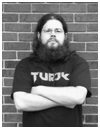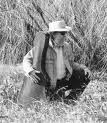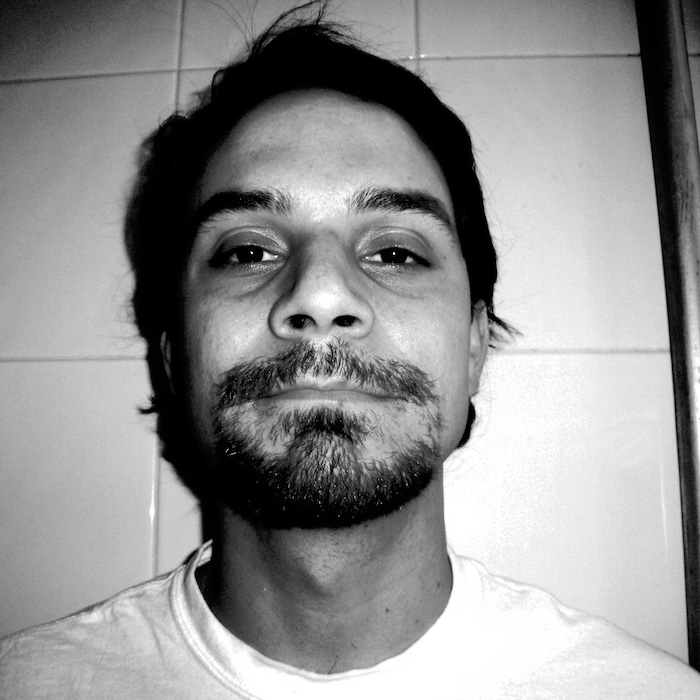Our supervisors have purchased bullwhips. They are intended to keep us obedient and productive. Violence persuades.
Of my country, this factory occupies a third of the land. I have lived here since I was born, and I have worked here since I was young enough to perform simple tasks. The factory produces articles of clothing. Why? Because in my country every citizen is required to wear clothes that bear the dictator’s likeness. No other clothing is permitted. The people are given choices of what they want and where they want it. Example, if you want a T-shirt, there are many things you can get on it: a color patch of the dictator’s face, a black and white patch of the dictator’s birth year (1948), a black and white patch of the dictator’s motto—A Closed Fist Shuts an Open Mouth—the dictator’s last name in white letters, and your citizen number in white numbers. These patches can be placed anywhere in good taste on any article of clothing. Example: the red T-shirt I’m wearing has the dictator’s face on the center chest, the dictator’s birth year on the left and right sleeve, and the dictator’s motto on the center back. Limited customization tricks people into thinking they have a choice in the matter, when in reality, they do not; that is, they must wear the clothing and at least one patch.
Realize: This factory is so large that I have never been in any of its corners. In my section, situated in the middle of the plant, illustrated on maps posted at various locations, I see factory in every direction as far as I can see. It is like looking at the ocean or sky, knowing each isn’t limitless though your eyes tell you otherwise. I see the sky once per day, to collect vitamins from the sun so I will be healthier and I will be able to live longer and work longer and better. I have not seen the ocean, yet, but I have been told it takes breaths away.
“2-1-2-2-7,” my section supervisor says, addressing me. His voice breaks my concentration and reading the customization sheet so to ascertain which patches Citizen No. 43,479,023 wants on his sweatshirt. The patches for men are in small blue bins and the patches for women are in small red bins. I scan the bin’s code with a Radio Frequency (RF) gun, which transmits the removal to inventory. This way, the factory can tally how many patches are left and when and how many they will need to manufacture in the coming days.
“Yes, sir?”
“You’ve been chosen for a special task, 21,227.” My supervisor resembles a rat. He has black hair, a black moustache, a long nose. He is thin.
“Sir?”
“You’ve been selected to help fix the cogs in the industry room.”
“I do not know how to perform this task, sir,” I say, afraid that if I make a mistake I will be whipped, or if the mistake is too grave, shot.
“They will show you how.”
“What about Citizen No. 43,479,023?”
“I’ll take care of him.”
I hand him my customization sheet and RF gun. He gives me an overhead map of the factory’s layout with a red line marking my current location to where I am supposed to go.
“What about my UPH, sir?” I must pick patches for twenty-five Units Per Hour.
“Don’t concern yourself with it. We’ve taken you off UPH for the time being.”
“Thank you, sir.”
“Hurry along now.”
I am relieved to be unconcerned with my UPH, so I focus on the map—a square, laminated piece of white paper, like the square sections of the plant. The path leads south, by the map’s compass, and through the rest of my section, into the next where after us pickers are finished, the bags containing the clothing and customization sheets are sent to the setters, who make sure the citizen numbers are arranged correctly and are straight. They use a ruler to establish a level surface on a light box with a white opaque top and a light bulb in its center and green tape to connect the numbers together so they are one object to handle rather than several. The light box helps a worker locate defects—small holes in numbers or patches.
I am unsure of the exact time it takes to reach the end of the setting section, though I believe it to be an hour by foot. I am not ranked high enough use the shuttle cars.
Realize: They teach everyone how to read and write, because being able to read and write helps us become better workers; we can communicate with each other about work-related matters.
Next, I enter the press section, where workers press patches, letters, and numbers onto clothes. It is hotter and noisier in this part. I do not know how to operate the presses. They are large black metal contraptions that use steam.
It takes me another hour to reach the edge of the packing area, where clothes are packaged and forwarded to the shipping bay. The map indicates that I should turn right where a door stands.
In the dark, my hands do not locate a light switch on either wall, so I swat at the air, finding a string. I tug on the string and the light bulb shines over the first flight of many stairs. I count ten per flight. On the first landing there is a rack of flashlights and a Water Distribution Unit (WDU) in the corner. Our leaders are not stupid. They know a dehydrated worker will soon be a useless worker. I remove a flashlight from the rack and pluck two batteries from the battery well. The light is dim, and I attempt to illuminate more of the stairwell, but the light does little good when the stairs stretch for what must be kilometers.
While peering over the railing’s edge, I accidentally drop the flashlight. It spirals downward—still lit—until it disappears in the blackness. There should be a sound when it hits the bottom, so I listen for the tiny clank.
I think: destruction of company property. I think: they can kill me for this. Panic. Grip railing. Release some tension.
In the dim stairwell I scan the walls for mounted security cameras, though there are none. There may not be an immediate punishment. They know, as well as I, that the fear of consequence is often worse than the consequence itself. I lift another flashlight and set of batteries.
Periodically I glance over the edge, checking for lights or anything that hints at a bottom, and much later, when I reach the bottom, I survey the landing and spot the flashlight I had dropped, along with its batteries, which must have escaped upon impact. Oddly, the flashlight is intact.
I place it and its batteries in the rack. The other I will put away when I am convinced I will no longer need it. I consider checking the flashlight I dropped to see if it works, but I do not. When they ask me if I broke a flashlight, I can say: I do not know. They will ask: are you lying? I will say: no.
Another WDU. Drink more water. I have learned to never pass up water, because when I have, I have always regretted it.
The door reads: AUTHORIZED PERSONNEL ONLY. I do not know if I am authorized personnel, but I have been summoned to perform a job. The map led me here. I reach the next door. It is light brown and reads: WOI in white letters. I return the flashlight and batteries to the rack beside the door then open it and walk inside.
Giant gray cogs, unmoving, stretch from the floor to what I presume must be an eventual ceiling. I squint, attempting to find it, but it is no use. Only cogs.
“These are what you call the Wheels of Industry!” a voice shouts. I do not know from where it came. The room is circular—the tower of cogs rests in the middle—so I walk toward the opposite side of the tower surrounded by a yellow railing, meant to protect bystanders from a churning machine.
“Hello?” I say.
“Around back.”
When I reach the back of the tower, I see a man in greasy overalls working on a cog with a wrench. He is leaning down, but as soon as he notices me, he stands. The man reminds me of a bear: tall and big with plenty of extra fat. His clean-shaven face does not fit his body.
“Like I said, welcome to the Wheels of Industry,” he says.
“Thank you.” I extend my hand and the bear wipes his right hand on his overalls then shakes.
“I’m 1-1-9-6-4,” he says. “You’re 2-1-2-2-7, right? The one who’s supposed to help me?”
“Yes, but you will have to teach me.” I try to control my nervousness. I do not want it to distort my voice.
“Teach? No need. There’s a steel-toed boot stuck where two cogs meet, which is gumming up the entire system. We need you to get it out.” He points, though I cannot see where the boot is. He walks to a panel in the wall, a few meters away, and slides the panel to the side, revealing an aluminum ladder, workbench, and numerous tools. He selects the ladder and erects it next to the tower. It is a tall ladder, but not one that requires added support. “You’re up,” he says, pointing again.
“Find the boot and remove it?”
“Right. And be careful. The cogs will begin moving when the boot is out, so you’ll have to act fast. Getting out of the tower will be the hardest part.”
I refuse to show fear while climbing the ladder and entering the tower between many cogs. The tower is dense, easy to find and navigate footholds. Soon, I locate the boot wedged in between two cogs. I take out my knife, standard issue, and cut through the leather, sawing off every piece I can.
The cogs will move quickly, likely grab my hands and arms, when I free the boot. I continue to slice, throwing each piece out of the tower, hoping the cogs will crush the rest. My skin leaks sweat. Finally, after withdrawing every last portion I can, I put my knife away and grip the remaining leather with both hands. With one jerk it snaps. Instantly, the tower wakes with metallic groans, and the two cogs smash the remaining steel toe. I jump to the center, a circular disc, and hold onto the pole in the middle that runs from the bottom to the top of the structure. One, two, three rotations, and I leap through the hole in the cogs and hit the ladder. We both fall to the ground.
Once the clang has subsided, I check myself for injuries. There are none apparent, though the fall was painful.
Days later, I learn my “heroic act” has come to the attention of those who maintain the company newsletter. They interview me for an upcoming issue.
Q: “Were you afraid you would be killed while removing the boot?”
A: “Yes.”
Q: “Are you proud that our esteemed leader has noticed your efforts and praised you for them?”
A: “Yes.”
Q: “What would you like to say to your fellow countrymen?”
A: “You are able to eat, to drink, to sleep, to engage in activities the dead cannot. Realize yours is not a wondrous existence, but at least you are alive.”
I do not say: Realize it can be better than you can imagine if we rise against our oppressors.
Jason Jordan holds an MFA from Chatham University. His forthcoming books are Cloud and Other Stories (Six Gallery Press, 2010) and Powering the Devil’s Circus: Redux (Six Gallery Press, 2010). His prose has appeared online and in print in over forty literary magazines, including Hobart, Keyhole, Monkeybicycle, Night Train, PANK, Pear Noir!, and Storyglossia. Additionally, he’s Editor-in-Chief of decomP, accessible at www.decompmagazine.com. You can visit him at his blog at poweringthedevilscircus.blogspot.com.





